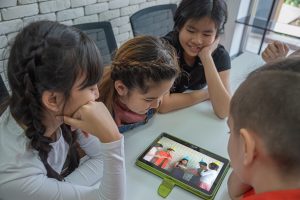Contents
- 1 Why Social Interaction Matters and How It Works in K-12 Online Schools?
- 2 Student’s Role in Social Interaction in K-12 Online Schools
- 3 Parent’s Role in Social Interaction in K-12 Online Schools
- 4 Teacher’s Role in Social Interaction in K-12 Online Schools
- 5 Pros and Cons of Social Interaction in K-12 Online Education
- 6 How Online Students Stay Connected and Social?
- 7 Conclusion
Online education became common in the 21st century. Millions of students worldwide receive K-12 education online. They complete assignments on laptops and interact in virtual classrooms. They gain knowledge and develop social skills through the internet. We’ll examine social interactions in K-12 education schools.

Social interactions in K-12 online education help develop different social skills through virtual connections. These skills include conflict resolution, empathy, effective communication, and teamwork. Let’s look closely at socialization in online education and why it’s important.
Why Social Interaction Matters and How It Works in K-12 Online Schools?
The study “Socialization in Online Classroom” by C. Irwin and Z. L. Berge explores the impact of socialization in online education. It shows online courses boost student engagement and participation, especially for less active students.

Socialization in online school builds communication skills, creates a sense of belonging, offers support, and prepares students for real-world interactions. Students communicate and engage with teachers and peers through virtual platforms. These social interactions include participating in discussions, collaborating on projects, working on group assignments, and sharing ideas. Socialization in online school helps students gain social experiences for the future.
Students, parents, and teachers each play a key role in online school social interactions. Here’s a brief overview of their roles.
Student’s Role in Social Interaction in K-12 Online Schools
Students are the key to building and developing social interactions. Students join online discussions and work on group projects to connect with peers. Students start conversations and collaborate to build a community. Feedback helps them grow and stay engaged in online learning. Students drive social interactions. Teachers and parents support and enhance these efforts.
Parent’s Role in Social Interaction in K-12 Online Schools
Parents are crucial for building healthy social interactions for students in K-12 online schools. They facilitate offline meetups and balance online and offline activities. Parents help facilitate social interactions by supporting their children’s participation in online activities. Parents monitor interactions to address any issues in social interactions. They provide resources and tools for social experiences. Parents keep in touch with teachers about social dynamics.

Teacher’s Role in Social Interaction in K-12 Online Schools
Teachers are mediators between students and parents. Teachers help parents build healthy social interactions with students. They create opportunities for students through discussions and group projects. Teachers facilitate communication and manage student’s activities to ensure collaboration. Teachers handle conflicts and give feedback on social skills to students and parents.
Pros and Cons of Social Interaction in K-12 Online Education
Social interaction in online education has its pros and cons. We highlight five main advantages and disadvantages.

The advantages of social interactions in online education include:
- Students feel less pressure with more time to think.
- The virtual classroom reduces bullying and harassment.
- Personalized feedback lowers stress compared to public feedback.
- Students connect with peers globally and learn about different cultures.
- Online education reduces discrimination based on clothing.
The disadvantages of social interactions in online education include:
- Real-life meetings are limited.
- Students work harder to form strong bonds with peers.
- Social interaction is low for passive students.
- Text-based communication leads to conflicts and misunderstandings.
- Students work harder to get feedback from teachers.
Online School Socialization Opportunities
Online schools offer various opportunities for socialization. Table below shows ten social opportunities and their brief descriptions for students at Legacy Online School.
| SOCIAL OPPORTUNITY | SHORT DESCRIPTION |
|---|---|
| Extracurricular activities and virtual clubs | Legacy Online School offers four online clubs for developing social and specialized skills. Specialized skills include programming, math, art, and language learning. The clubs are Coding club, STEM club, art club, and language and culture club |
| Collaborative learning platforms | Tools for group study and project collaboration |
| Virtual class discussions | Live or recorded discussions on class topics |
| Group projects | Collaborative assignments with classmates |
| Interactive workshops | Skill-building sessions with peer interaction |
| Peer tutoring | Students helping each other with difficult subjects |
| Discussion forums | Online spaces for topic-based conversations |
| Social media groups | Private groups on social platforms for school communities |
| Online competitions | Contests in various subjects or skills |
Social Opportunities Outside of Online School
Students organize social opportunities outside of online school using its tools. They create meetings and communities on social networks. They plan events like museum visits, exhibitions, or concerts based on their interests. Online schools encourage and support students to meet outside of the virtual classroom.
How Online Students Stay Connected and Social?

Students use various methods to stay connected and interact with peers. These methods are provided by both online schools and the internet. They include virtual study groups, discussion forums, messaging apps, video calls, and chats. The most common way for students to maintain social connections is through social media. These social media include Facebook, Instagram, X, and TikTok.
|
Parents, Take Note
The study “Relationship between Social Media Use and Social Anxiety in College Students: Mediation Effect of Communication Capacity” by Fengxia Lai and colleagues found passive social media use increases social anxiety. Active social media use decreases social anxiety. Communication capacity mediates partially these effects. The research involved 1,740 students from seven colleges in China. |
Conclusion
Social interaction in online schools is as crucial as in traditional settings. Students, parents, and teachers each play a role in making social interaction successful. We’ve discussed their roles, along with the benefits and drawbacks of social interaction in online education. Students are proactive and organized to navigate these challenges and fully engage in online social interactions.








